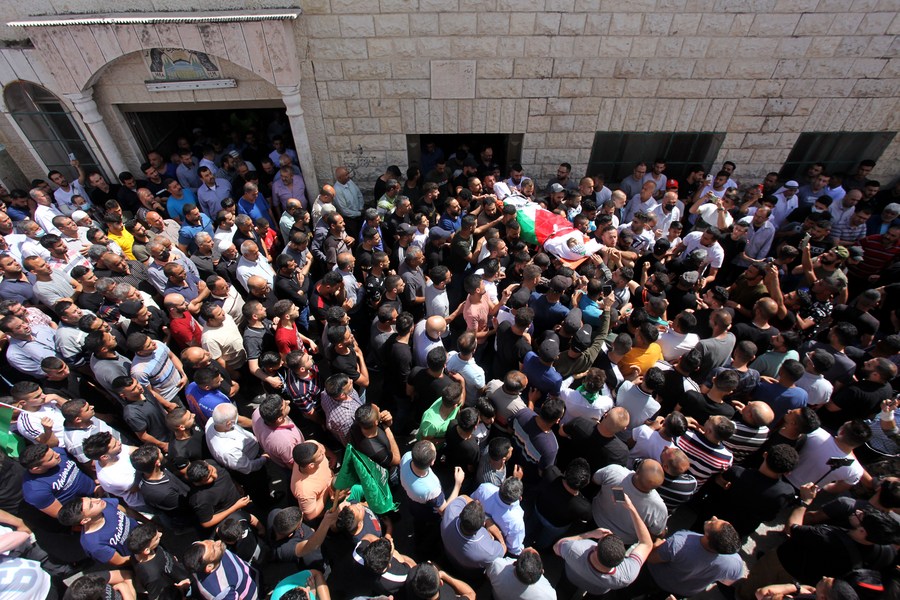China calls for action, solidarity on Mideast conflict


China on Sunday highlighted the urgent need for the international community to stand in solidarity to prevent the Palestinian-Israeli conflict from further deteriorating.
The escalation in the conflict has caused heavy casualties, including those of women and children, Chinese State Councilor and Foreign Minister Wang Yi said during an emergency UN Security Council public debate on the situation in the Middle East.
"The situation is dangerous and urgent. It calls for an immediate cease-fire and the stop of violence. The international community must take actions right now and to make every effort to avert the further deterioration of the situation, prevent the region from backsliding into turbulence, and to protect people's lives," Wang said.
The Sunday morning session, chaired by Wang as China is Security Council president for May, marked the third emergency meeting convened by the council in a week over the conflict.
The Palestinian question remains at the heart of the Middle East situation, Wang said. Lasting peace and common security can only be achieved in the region when the Palestinian question is resolved in a comprehensive, fair and durable manner, he added.
China calls for a cease-fire and a cessation in violence, which Wang said is "the most pressing task". China strongly condemns violence against civilians, he said. It once again urges parties in the conflict to immediately cease military actions and hostilities, as well as to stop such moves as airstrikes, ground offensives and rocket launches that aggravate the situation.
He urged Israel to "exercise restraints", to observe the relevant UN resolutions, and stop the demolition of Palestinian homes and evictions of Palestinian people. Wang also called on the Palestinian side to avoid steps that may further escalate the situation.
Humanitarian need is urgently needed, Wang pointed out. China asks Israel to fulfill its obligations under international treaties, to promptly lift the blockade on Gaza, to guarantee the security and rights of civilians in the occupied territories and to facilitate the access of humanitarian assistance.
Wang appealed to the international community to extend international aid to Palestine. He said the UN needs to play its coordinating role and "make earnest effort to avert a humanitarian disaster".
"International support is a due obligation. The Security Council, shouldering the primary responsibility for safeguarding international peace and security, must take strong actions for the Palestine-Israel conflict, reiterate its firm support for the two-state solution, and do more to cool down the situation as soon as possible," he said.
China has been working with relevant countries on a Security Council press statement, Wang said, but due to the "obstruction of one country", it hasn't been able to "speak with one voice", the foreign minister said.
He asked the US to "shoulder its due responsibilities, take a just position", and supports the Security Council in easing the situation, rebuilding trust and advancing political settlement.
Wang expressed support for the UN, the League of Arab States and the Organization of Islamic Cooperation as well as countries with influence in the region to play a more active role in the area.
The foreign minister stressed that the "two-state" solution is the fundamental way forward.
China supports a resumption of peace talks between Palestine and Israel on the basis of the "two-state" solution as soon as possible, he said. China also supports the establishment of an independent state of Palestine that enjoys full sovereignty on the basis of the 1967 borders, with East Jerusalem as its capital.
China has attached great importance to the current tension in the Middle East since assuming the presidency of the Security Council, Wang said. He reaffirmed China's invitation to the Palestinian and Israeli peace advocates to continue their dialogue in China, which also welcomes representatives of the two sides to come to China for direct negotiation.
The open debate Sunday was joined by the UN Secretary-General António Guterres and UN Special Coordinator for the Middle East Peace Process Tor Wennesland as well as diplomats and officials from Palestine, Israel, Jordan, Egypt, Algeria and the League of Arab States.
As with the two previous closed consultations the Security Council held in the past week over the conflict, the session Sunday was requested by China, Norway and Tunisia.
In a joint statement, the three countries reiterated their "deep concerns" about the rising number of civilian casualties and demanded an immediate cessation of hostilities.
Zhang Jun, China's permanent representative to the UN, said China will continue to push the Security Council to take prompt actions and to "speak in one voice", in its capacity as council president for May.
The Palestine-Israel conflict has stretched into a seventh day as the death toll from both sides continued to climb.
As of Sunday afternoon, at least 192 people, including 58 children, have been killed in the Gaza Strip by Israeli forces during the weeklong bombing campaign, according to Palestinian authorities. More than 1,200 people have been injured. At least 10 Israelis, including two children, died in rocket attacks by militant groups in Gaza.
An Israeli airstrike on Gaza City flattened three buildings and killed at least 42 people on Sunday, Palestinian health officials said. On Saturday, an airstrike from Israel destroyed a 12-story building that housed international news outlets, including The Associated Press and Al-Jazeera.
The latest conflict erupted after clashes between Israeli security forces and Palestinian protesters at Al-Aqsa Mosque in Jerusalem on May 10.

































